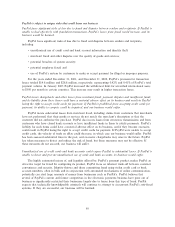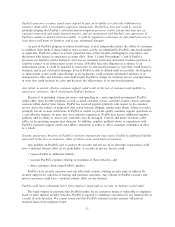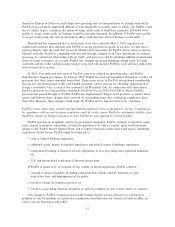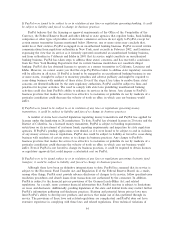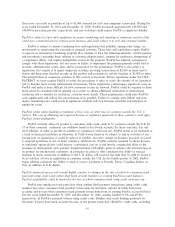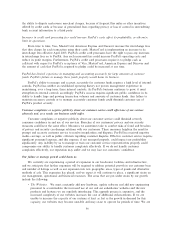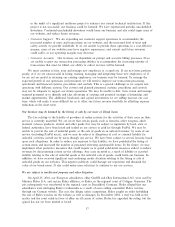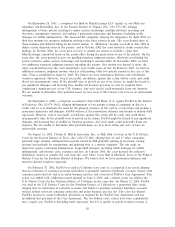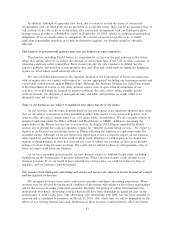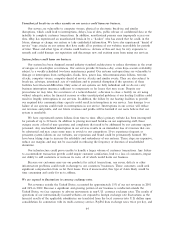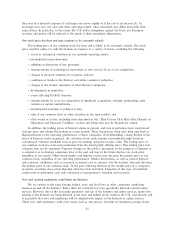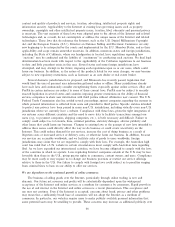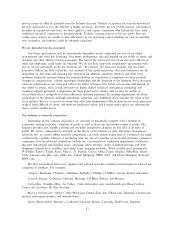eBay 2002 Annual Report Download - page 61
Download and view the complete annual report
Please find page 61 of the 2002 eBay annual report below. You can navigate through the pages in the report by either clicking on the pages listed below, or by using the keyword search tool below to find specific information within the annual report.may have to change its anti-fraud operations in a manner that will harm its business and pay substantial
damages. Even if its defense is successful, the litigation could damage PayPal's reputation, could require
signiÑcant management time, will be costly and could require changes to its customer service and
operations that could increase its costs and decrease the eÅectiveness of its anti-fraud program.
Three purported class action complaints were Ñled following announcement of the PayPal merger in
July 2002 in the court of Chancery in the State of Delaware in and for New Castle County by alleged
stockholders of PayPal. Two additional purported class action complaints were Ñled in the Superior Court
of the State of California, County of Santa Clara, by alleged PayPal stockholders. These complaints name
as defendants PayPal and each member of its board of directors as well as eBay. The complaints are
purported class actions that allege, among other things, that eBay controlled PayPal prior to the execution
of their merger agreement, the defendants breached Ñduciary duties they assertedly owed to PayPal's
stockholders in connection with PayPal entering into the merger agreement and the exchange ratio in the
merger was unfair and inadequate. The plaintiÅs seek, among other things, an award of unspeciÑed
compensatory damages. We believe that each of the lawsuits is without merit and intend to defend
ourselves vigorously.
Other third parties have from time to time claimed, and others may claim in the future, that we have
infringed their past, current or future intellectual property rights. We have in the past been forced to
litigate such claims. We may become more vulnerable to such claims as laws such as the Digital
Millennium Copyright Act and Communications Decency Act are interpreted by the courts and as we
expand into jurisdictions where the underlying laws with respect to the potential liability of online
intermediaries like ourselves is less favorable. We expect that we will increasingly be subject to copyright
and trademark infringement claims as the geographical reach of our services expands. We also expect that
we will increasingly be subject to patent infringement claims as our services expand. In particular, we
expect that patent infringement claims involving various aspects of our Payments business will continue to
be made. We have been notiÑed of several potential disputes and are subject to a suit by Tumbleweed
Communications Corporation that is currently ongoing. These claims, whether meritorious or not, could be
time-consuming, result in costly litigation, cause service upgrade delays, require expensive changes in our
methods of doing business or could require us to enter into costly royalty or licensing agreements, if
available. As a result, these claims could harm our business.
Our business may be harmed by the listing or sale by our users of pirated or counterfeit items.
We have received in the past, and we anticipate we will receive in the future, communications
alleging that certain items listed or sold through our service by our users infringe third-party copyrights,
trademarks and tradenames or other intellectual property rights. Although we have sought to work actively
with the content community to eliminate infringing listings on our websites, some content owners have
expressed the view that our eÅorts are insuÇcient. Content owners have been active in defending their
rights against online companies, including eBay. Allegations of infringement of third-party intellectual
property rights have in the past and may in the future result in litigation against us. Such litigation is
costly for us, could result in increased costs of doing business through adverse judgment or settlement,
could require us to change our business practices in expensive ways, or could otherwise harm our business.
Litigation against other online companies could result in interpretations of the law that could also require
us to change our business practices or otherwise increase our costs.
Our business may be harmed by fraudulent activities on our websites.
Our future success will depend largely upon sellers reliably delivering and accurately representing their
listed goods and buyers paying the agreed purchase price. We have received in the past, and anticipate
that we will receive in the future, communications from users who did not receive the purchase price or
the goods that were to have been exchanged. In some cases individuals have been arrested and convicted
for fraudulent activities using our websites. While we can suspend the accounts of users who fail to fulÑll
their delivery obligations to other users, we do not have the ability to require users to make payments or
deliver goods or otherwise make users whole other than through our limited buyer protection programs.
59



